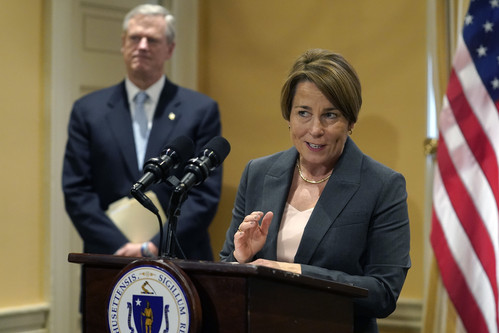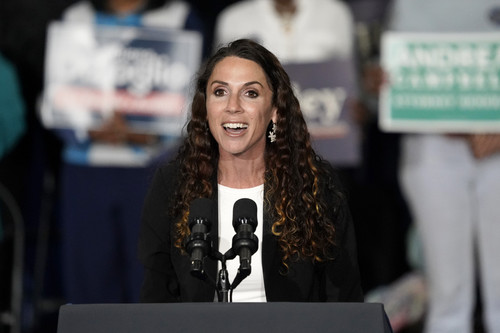| View in browser |

Presented by Save Our Benefits Massachusetts
FIRST IN PLAYBOOK: NEW RATINGS ARE IN — Charlie Baker sure has some staying power in the minds of Massachusetts voters.
Baker remains the most popular politician in the state, according to a new survey that shows 55 percent of respondents view the Republican governor favorably two months after he left office. And 27 percent view the new NCAA president unfavorably, according to the Change Research poll for Northwind Strategies.
Marty Walsh and Maura Healey are neck-and-neck behind him. Forty-two percent of respondents have a positive view of Walsh, while 26 percent view the outgoing Labor secretary negatively.
The new governor starts with a 46-percent favorability rating, while 31 percent view her unfavorably. The online poll of 711 likely 2024 voters was conducted Feb. 20-23 and has a margin of error of 3.9 percentage points.

Then-Gov. Charlie Baker looks on as then-Gov.-elect Maura Healey talks to reporters on Wednesday, Nov. 9, 2022. | AP
For Healey, these results are a benchmark. The survey was done before Healey released her first budget proposal — the clearest portrait yet of how the Democrat intends to govern. The next poll in the planned series will help capture whether voters’ attitudes change toward her because of it. And it'll show whether emulating — and in some cases exceeding — Baker's proposed tax breaks can help her close the polling gap with her predecessor.
Healey is "starting from a really solid net favorability rating. And she’s starting with a hardcore group of people who are very favorable to her” when looking at Democrats and Democratic-leaning independents, Northwind Strategies’ Doug Rubin told Playbook. “In any political situation, that’s great to have.”
Rubin said the poll also carries a message for anyone thinking of challenging Sen. Elizabeth Warren in 2024: "don’t." Warren’s favorability rating among all respondents was 47 percent, while 41 percent viewed her negatively. But she tops the list with a whopping 83 percent when it’s just Democrats and Democratic-leaning independents — aka likely Democratic primary voters — weighing in.
GOOD WEDNESDAY MORNING, MASSACHUSETTS. Diana DiZoglio is no stranger to standing up to legislative leaders from the inside. Now she’s trying to audit them from the outside.
DiZoglio told Playbook she wants to give taxpayers more access to one of the nation’s least transparent legislatures. And you can imagine what DiZoglio, who spent a decade serving in the House and Senate, might be looking to make public here. She’s well aware of how committee votes are kept private and what happens to lawmakers who buck leadership — things she fought against as a legislator and pledged to shine light on while campaigning for auditor.
DiZoglio wants access to a lot of things for her review: information about hiring and procurements, the committee-assignment process and "the adoption and suspension of House and Senate rules" were all listed in the letters she sent to Democratic leaders yesterday alerting them to the probe.

Then-state Sen. Diana DiZoglio campaigning for auditor on Nov. 2, 2022. | AP
Whether she gets all that is a different story. There’s some disagreement over whether DiZoglio actually has the authority to audit the Legislature. Former Auditor Suzanne Bump told CommonWealth Magazine she didn’t . DiZoglio points to the governing statute of the auditor’s office to say she does. But the Legislature’s exemption from public records law, which didn’t exist when the body was last audited a century ago, could complicate things.
And it seems she’s already meeting some resistance. A spokesperson for Senate President Karen Spilka said her chamber has the power to "set its own rules," is already audited each year by a certified public accounting firm and already makes its journals, calendars and session recordings public.
TODAY — Healey and Lt. Gov. Kim Driscoll visit Strong Women Strong Girls at 3:30 p.m. in Boston. Driscoll attends a Cape Ann Chamber of Commerce breakfast at 7:30 a.m., visits Beverly Middle School at 10 a.m. and visits Groundwork Lawrence at noon. Boston Mayor Michelle Wu speaks at the Greater Boston International Women's Day Breakfast at 9:50 a.m. at Simmons University.
Tips? Scoops? Thoughts on how the state's top pols stack up? Email me: lkashinsky@politico.com .
A message from Save Our Benefits Massachusetts:
In a time when there is so much that is driving up the price of health care - Pharmacy Benefit Managers (PBMs) create competition to bring prescription drug costs down.
Find out how PBMs are advocating to lower drug costs on behalf of employers and unions.
| DATELINE BEACON HILL |
— OFF TRACK: Gov. Maura Healey blew her self-imposed 60-day deadline for hiring a transportation safety chief on Monday. On Tuesday she told reporters that bringing one on board will be a matter of “days, not weeks.” She’s also in the final stages of hiring her new MBTA general manager.
— “Healey setting new tone with Legislature,” by Bruce Mohl, CommonWealth Magazine: “After eight years working with Republican Gov. Charlie Baker, everyone wondered how the Democrat-dominated Legislature would get along with Gov. Maura Healey. Judging from the governor’s presentation of her budget to a joint hearing of the House and Senate budget committees on Tuesday, it appears the relationship with her fellow Democrats is off to a good start. Healey came across as respectful of the Legislature’s role. She mentioned several times that she doesn’t have all the answers. She signaled a willingness to listen and collaborate with legislators on legislation. There was almost no tension during the lengthy hearing.”
— “Healey is pushing a plan to make calls free in Massachusetts state prisons — with limits,” by Matt Stout, Boston Globe: “Advocates who have long pushed to make phone calls free for the state’s incarcerated people appeared to have scored something highly unusual so early in Beacon Hill’s new legislative session: a seeming glide path to their priority becoming law. … But in reviving the issue, [Gov. Maura] Healey would also set a monthly 1,000-minute cap for free calls per person, making it one of the most restrictive such programs among those adopted across the country. She is also seeking to limit the change to the Department of Correction.”
— “Galvin seeks more money for early, mail voting,” by Christian M. Wade, Eagle-Tribune: “Testifying before the Legislature’s Joint Ways and Means Committee on Tuesday, Secretary of State Bill Galvin said the $18 million proposed by Gov. Maura Healey for his election division is about $6 million short of what he says is needed to cover the cost of running statewide and local elections in the next fiscal year. … Galvin said cities and towns are still owed $1 million for costs incurred as part of the 2022 elections, which he said isn’t included in the proposed $18 million.”
— BUT WAIT, THERE'S MORE: Auditor Diana DiZoglio launched her audit of the Legislature hours after asking lawmakers for more money for her office during yesterday’s budget hearing at the State House, CommonWealth Magazine’s Jennifer Smith reports. A cheaper alternative, auditing government agencies every four years instead of three, was a recommendation the governor tacked onto her budget.
— STAYING PUT: State Rep. Jessica Giannino says she won't run for Revere mayor. She was one of several top pols eyeing the seat that's coming open after Mayor Brian Arrigo said he wouldn't seek a third term.
— "Governor Healey to establish a statewide missing persons unit," by Hanna Krueger, Boston Globe: "Governor Maura Healey is pledging to dedicate $300,000 to establish a new statewide unit for missing persons investigations, her office announced Wednesday."
STEP INSIDE THE WEST WING : What's really happening in West Wing offices? Find out who's up, who's down, and who really has the president’s ear in our West Wing Playbook newsletter, the insider's guide to the Biden White House and Cabinet. For buzzy nuggets and details that you won't find anywhere else, subscribe today .
| VAX-ACHUSETTS |
— “HCC, other colleges to drop vax requirement after spring semester,” by Mary Byrne, Daily Hampshire Gazette: “A year and half after the mandate first went into place, all Massachusetts community colleges, including those in Holyoke and Greenfield, will no longer require COVID-19 vaccines for enrollment.”
| FROM THE HUB |
— DECISION DAY: Two of Boston Mayor Michelle Wu ’s biggest policy priorities come before the City Council today — rent control and restructuring the Boston Planning & Development Agency. Wu’s rent-control plan has majority support from voters , per the Boston Globe’s Emma Platoff . But it’s facing pushback from councilors on both sides of the ideological spectrum and from the real-estate industry, which launched a nearly $400,000 advertising campaign to try and kill it. The council kicks off at noon .
— “Downtown Boston organization bashes BPDA reform mechanism,” by Sean Philip Cotter, Boston Herald: “The Alliance of Downtown Civic Organizations is blasting the Wu administration’s approach to BPDA overhaul, particularly hitting it over the fact that only one of the nine members tasked with putting together reforms to the large-project permitting process is from a neighborhood group.”
— “Boston Police Commissioner Cox supports ending dismissal appeals,” by Saraya Wintersmith, GBH News: “Boston Police Commissioner Michael Cox expressed support Tuesday for removing arbitration as an option for fired officers to regain employment. Cox, who officially assumed leadership of the department in August, said the police department should also improve the quality of its internal investigations and its disciplinary history records.”
— “Felix D. Arroyo retiring as register of probate,” by Sean Philip Cotter, Boston Herald: “Felix D. Arroyo has retired as Suffolk register of probate and family court, opening up another one of the low-profile but high-paying countywide elected seats.”
A message from Save Our Benefits Massachusetts:
| PLANES, TRAINS AND AUTOMOBILES |
— “Ride-hailing drivers rally in support of bill allowing them to unionize,” by Lucia Maffei, Boston Business Journal: “[The bill would] grant drivers access to collective bargaining rights, discrimination protection, unemployment insurance, paid sick time and guaranteed minimum wage.”
— “After 3 ‘troubling’ incidents at Logan Airport, Stephen Lynch ‘demands’ review of FAA flight operations,” by Rick Sobey, Boston Herald.
| DAY IN COURT |
— “Judge considers requests for triple damages in official's ouster,” by Julie Manganis, Daily News of Newburyport: “A judge is now considering a request to triple the $820,000 awarded by a jury in November to the former chair of the Sex Offender Registry Board over her removal by former Gov. Deval Patrick in 2014.”
— "SJC rules that free speech at public hearings includes right to use ‘rude, personal, and disrespectful’ words," by John R. Ellement, Boston Globe.
| WARREN REPORT |
FOX NEWS????? NOT THE HEADLINE DIFFERS FROM SENATOR WARREN'S COMMENT!
— “Sen. Warren weighs in on movement to change Massachusetts state flag over 'White supremacy culture',” by Jon Michael Raasch, Fox News: “‘There are people who are reconsidering the flag in Massachusetts, and I support those efforts,’ [Sen. Elizabeth] Warren told Fox News in a brief exchange on Capitol Hill.”
DOWNLOAD THE POLITICO MOBILE APP: Stay up to speed with the newly updated POLITICO mobile app, featuring timely political news, insights and analysis from the best journalists in the business. The sleek and navigable design offers a convenient way to access POLITICO's scoops and groundbreaking reporting. Don’t miss out on the app you can rely on for the news you need, reimagined. DOWNLOAD FOR iOS – DOWNLOAD FOR ANDROID .
| FROM THE 413 |
— “Holyoke councilor labeled ‘threat’ in police audit pushes back: ‘I am harmless’,” by Luis Fieldman, MassLive: “A recent audit of the Holyoke Police Department found low morale amongst the rank and file. At the top of the list of ‘threats’ listed under the section for patrol officers and detectives: City Hall. … The audit made note that Israel Rivera, an at-large city councilor, is a convicted felon and is the chair of the public safety committee. Another councilor, Wilmer Puello-Mota, is on bail release from Rhode Island on child sex abuse image charges. A city councilor previously referred to the department as a ‘gang.’”
| THE LOCAL ANGLE |
— “UMass Dartmouth hid sex assault allegations against former police officer, report finds,” by Walter Wuthmann, WBUR: “A scathing investigation found the University of Massachusetts Dartmouth covered up allegations that a former campus police officer, David Laudon, sexually assaulted and harassed a student, allowing the officer to quietly resign and to go on to work for other police departments.”
| MEANWHILE IN NEW HAMPSHIRE |
— “In testimony and rally, crowds oppose Republican-backed bills targeting LGBTQ youth,” by Sarah Gibson and Paul Cuno-Booth, NHPR: “The proposals before New Hampshire lawmakers include bills to restrict access to gender-affirming care and to classify such care as child abuse. Republicans in both the House and the Senate have also brought forward updated versions of a parental rights bill that narrowly failed to pass last year, after Gov. Chris Sununu and others raised concerns that it could violate the rights of LGBTQ students.”
A message from Save Our Benefits Massachusetts:
For nearly 50 years, federal law and legal precedent has prevented state legislators from preempting federal laws governing self-funded ERISA plans. Health plans are offered by employers, labor-management trusts as well as local, state and federal governments. With roughly 60 percent or more of the health plans offered by ERISA protected entities, these protected plans could expect consistency across state lines and a fair regulatory climate.
Now, lobbyists for Big Pharma and independent pharmacists are looking to increase their profits by ignoring federal law and undermining the cost-savings in self-funded plans. Save Our Benefits Massachusetts is ready to help you fight back against rising costs. Please, Join our coalition today and help us keep health benefits affordable and accessible for employers, employees and unions.
| HEARD ‘ROUND THE BUBBLAH |
TRANSITIONS — Former Lt. Gov. Karyn Polito , former Somerville Mayor Joe Curtatone , former Boston Acting Mayor Kim Janey , former Boston Police Commissioner Ed Davis , 2018 Democratic gubernatorial nominee Jay Gonzalez , AAWPI's Diana Hwang , Boston economic opportunity and inclusion chief Segun Idowu, Keith Mahoney , Aisha Miller , Devin Quirk , Ellen Semonoff, Melissa Threadgill, Massachusetts Life Sciences Center President and CEO Kenneth Turner , Massachusetts Health & Hospital Association President Steve Walsh , Mitch Weiss, Phyllis Rappaport, Elisabeth “Lissy” Medvedow, Elizabeth Graham , Myojung Chung , Celina Barrios-Millner and Christopher Norio Avery have joined the Rappaport Institute’s advisory board .
— Abundant Housing MA has hired Julia Davidovitz and Joyce Mandell as regional organizers.
— Elisabeth Reynolds has joined Unless as partner. She previously was special assistant to the president for manufacturing and economic development.
HAPPY BIRTHDAY — to Emma Brodie and Axios Boston’s Mike Deehan.
Want to make an impact? POLITICO Massachusetts has a variety of solutions available for partners looking to reach and activate the most influential people in the Bay State. Have a petition you want signed? A cause you’re promoting? Seeking to increase brand awareness among this key audience? Share your message with our influential readers to foster engagement and drive action. Contact Jesse Shapiro to find out how: jshapiro@politico.com .
Follow us on Twitter
Lisa Kashinsky @lisakashinsky |
Subscribe to the POLITICO Playbook family
Playbook | Playbook PM | California Playbook | Florida Playbook | Illinois Playbook | Massachusetts Playbook | New Jersey Playbook | New York Playbook | Ottawa Playbook | Brussels Playbook | London Playbook
View all our politics and policy newsletters
FOLLOW US
POLITICO, LLC 1000 Wilson Blvd. Arlington, VA, 22209, USA |





